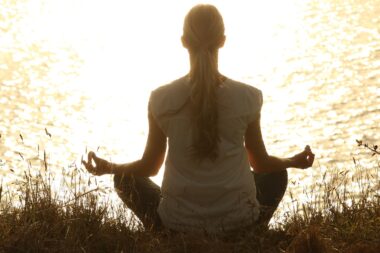How Daily Meditation Can Reduce Stress and Anxiety
Meditation has become a popular approach to managing stress and anxiety in our modern lives. Many individuals are seeking effective strategies to cope with the overwhelming pressures of daily routines. Implementing daily meditation practices can provide significant benefits for mental health. Meditation encourages mindfulness, enabling practitioners to focus on the present moment, which can help reduce feelings of stress. Research demonstrates that individuals who meditate regularly report lower levels of anxiety. This practice can also improve emotional regulation, making it easier to cope with daily challenges. By taking time to meditate, individuals often experience greater clarity and can think more clearly without the clutter of daily worries. Stressful thoughts can lead to decreased overall well-being, and meditation helps to counteract those effects. The best part is that meditation techniques can be easily learned and adapted to fit personal preferences. By integrating a short, daily meditation session into your routine, you can cultivate moments of peace that counterbalance the chaos of daily life. This article will delve into various aspects and benefits of meditation as a powerful tool for enhancing emotional health and stability.
When it comes to the different types of meditation practices, several options can cater to various preferences. Mindfulness meditation, for instance, is a widely recognized method. This approach encourages individuals to observe thoughts and feelings without judgment. Another popular form is loving-kindness meditation, which fosters compassion and goodwill towards oneself and others. Transcendental meditation focuses on utilizing specific mantras to transcend everyday thought patterns, promoting deep relaxation. Similarly, guided meditation often involves listening to recorded instructions that lead practitioners through calming visualizations. Each of these methods has unique benefits that can enhance mental clarity and emotional well-being. Regardless of the specific approach chosen, the essential element lies in the regular practice of meditation. Consistency is key, ensuring the positive effects compound over time and reinforce mental resilience. Additionally, many meditation apps and online resources make starting these practices accessible and manageable. This versatility allows individuals to find the best fit for their lifestyle and personal needs. Exploring various styles can also help maintain engagement in meditation, making it easier to stick with the practice as part of an overall well-being strategy.
The Science Behind Meditation and Anxiety Relief
Research into the relationship between meditation and anxiety relief has revealed compelling evidence supporting its effectiveness. Numerous studies have identified significant changes in brain activity related to anxiety reduction among regular meditators. Meditation has been found to increase gray matter density in regions of the brain associated with emotional regulation, which can lead to improved responses to stressors. Furthermore, meditation has also been linked to decreased levels of the stress hormone cortisol, contributing to a calmer mind and body. This physiological response not only alleviates anxiety symptoms but can also improve overall mental health. Additionally, practitioners often report a greater ability to detach from worries and intrusive thoughts, enabling them to respond to life’s challenges more effectively. Many findings suggest that individuals who meditate regularly tend to develop greater resilience against anxiety and stress. Overall, the physiological and psychological benefits of meditation create a holistic approach to mental well-being, addressing both mind and body. By fostering a regular meditation practice, individuals can thus empower themselves to manage stress and anxiety more effectively and cultivate enduring inner peace.
Creating a conducive environment for meditation can further enhance its calming effects. Choosing a dedicated space, whether it is a quiet corner of a room or an outdoor area, can significantly influence the quality of your meditation practice. Ensuring this area is free from distractions, such as loud noises and electronic devices, promotes a sense of serenity. Furthermore, incorporating elements that resonate with you, like candles, cushions, or soft blankets, can make your meditation experience more enjoyable. Another key aspect is establishing a consistent meditation schedule to build a routine. Setting aside specific times each day to meditate fosters accountability and allows the practice to become an integral part of daily life. Over time, your mind may even begin to associate that designated time with relaxation and calmness. It’s also beneficial to start with shorter sessions, gradually increasing the duration as you feel more comfortable. This approach allows you to ease into meditation without feeling overwhelmed. Remember that consistency will yield the best results and open the door to deeper experiences over time, which places you on a rewarding journey of self-discovery and mental wellness.
Overcoming Common Challenges When Starting Meditation
Embarking on a meditation journey inevitably presents challenges that new practitioners may face initially. One significant hurdle is the wandering mind; it’s perfectly normal for thoughts to drift during meditation attempts. Accepting this tendency is crucial as opposed to resisting or feeling frustrated by it. When you notice your mind wandering, gently bring your focus back to your breath or mantra without self-judgment. Another common challenge is finding the time to meditate regularly. Many people lead busy lives, making it seem difficult to carve out a few minutes daily for this practice. To overcome this obstacle, consider integrating meditation into activities you already engage in, such as walking or commuting. Additionally, utilizing guided meditations can help keep you on track and offer direction when you feel unsure of where to start. Building a supportive community, whether it’s a meditation group or online forum, can also encourage accountability and provide motivation. Sharing experiences with others can ease feelings of isolation in your practice and remind you that you are not alone in facing these challenges while on your path to improved mental health.
The benefits of daily meditation extend beyond stress reduction and anxiety relief; they also encompass improvements in overall well-being. Regular meditation practice can enhance focus, boost creativity, and increase emotional intelligence. As practitioners become more aware of their thoughts and feelings, they often develop better self-understanding and empathy towards others. This enhanced emotional awareness enables more effective communication and deeper connections in interpersonal relationships. Moreover, regular meditation fosters resilience by equipping individuals with skills to navigate life’s challenges with greater ease. As a deeper understanding of oneself is achieved, individuals can identify patterns that trigger stress or anxiety and develop healthier coping strategies. This proactive approach to mental well-being relates to personal growth and ensures a more fulfilling life experience. Furthermore, the sense of community that arises among those who meditate can foster deeper connections and shared experiences. By continuously engaging in meditation, you are investing in the long-term health of your mind. Individuals who make meditation part of their daily routine often report significant shifts in their perspectives on life, leading to improved happiness and life satisfaction by embracing a mindful attitude toward living.
Conclusion: Begin Your Meditation Journey Today
In conclusion, adopting a daily meditation practice can profoundly impact managing stress and anxiety levels. By exploring various techniques and tailoring your approach to personal preferences, achieving optimal benefits becomes attainable. The science supporting the positive effects of meditation strengthens its validity as an effective tool for mental health enhancement. Taking small steps to build a consistent practice will allow you to witness gradual yet lasting improvements in your emotional well-being. Remember to create a conducive environment, embrace challenges along the way, and celebrate every progress you make. Joining a meditation community can also provide an avenue for support and encouragement while sharing experiences. As you embark on this journey, you may discover not only the power of meditation but also a deeper connection to your true self. In the fast-paced world we live in, prioritizing mental health is essential, and daily meditation can become a crucial practice that nurtures a more mindful, peaceful life. Start today by dedicating just a few moments to meditation, and allow it to transform your relationship with stress and anxiety, leading you towards a path of lasting inner peace.





